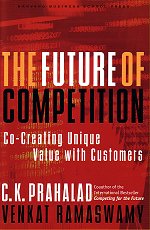For nearly a decade the TomorrowToday team has been predicting the emergence of a “connection economy”. An economic era driven by the interconnectedness of entities (as opposed to being powered by the entities themselves). The most obvious realisation of this vision is in social media and how a new way of working is emerging. Old mindsets of control and management are floundering in this new world.
We were obviously not the only ones predicting the emergence of this new reality. One of the books that helped shape our thinking was remarkably prescient in 2004. Here’s a great description of the “connection economy” from The Future Of Competition: co-creating a unique value with customers, by C K Prahalad and Venkat Ramaswamy (buy it at Amazon.co.uk, Amazon.com or Kalahari.net):
A profound, but silent, transformation of our society is afoot. Our industrial system is generating more goods and services than at any point in history, delivered through an ever-growing number of channels. Superstores, boutiques, online retailers, and discount stores proliferate, offering thousands of distinct products and services. This product variety is overwhelming to consumers. Am Ibuying the right digital camera? Am I getting the best treatment for my chronic ulcer? Am I signing up for the right service? Simultaneously, thanks to the propagation of cellphones, web sites, and media channels, consumers have increased access to more information, at greater speed and lower cost, than ever before. But who has the leisure and the proficiency needed to sort through and evaluate all these products and services? The burgeoning complexity of offerings, as well as the associated risks and rewards, confounds and frustrates most time-starved consumers. Product variety has not necessarily resulted in better consumer experiences.
For senior management, the situation is no better. Advances in digitisation, biotechnology, and smart materials are increasing opportunities to create fundamentally new products and services and transform businesses. Major discontinuitiesin the competitive landscape – ubiquitous connectivity, globalisation, industry deregulation, and technology convergence are blurring industry boundaries and product definitions. These discontinuities are releasing worldwide flows of information, capital, products, and ideas, allowing non-traditional competitors to upend the status quo. At the same time, competition is intensifying and profit margins are shrinking. Managers can no longer focus solely on costs, product and process quality, speed, and efficiency. For profitable growth, managers must also strive for new sources of innovation and creativity.
Thus, the paradox of the 21st-century economy: Consumers have more choices that yield less satisfaction. Top management has more strategic options that yield less value. Are we on the cusp of a new industrial system with characteristics different from those we now take for granted?…. The answer, we believe, lies in a different premise centered on co-creation of value. It begins with the changing role of the consumer in the industrial system.
The most basic change has been a shift in the role of the consumer – from isolated to connected, from unaware to informed, from passive to active. The impact of the connected, informed, and active consumer is manifest in many ways.”
The Future Of Competition: co-creating a unique value with customers, by C K Prahalad and Venkat Ramaswamy



Excellent article. Being connected with customers, partners and staff is THE future